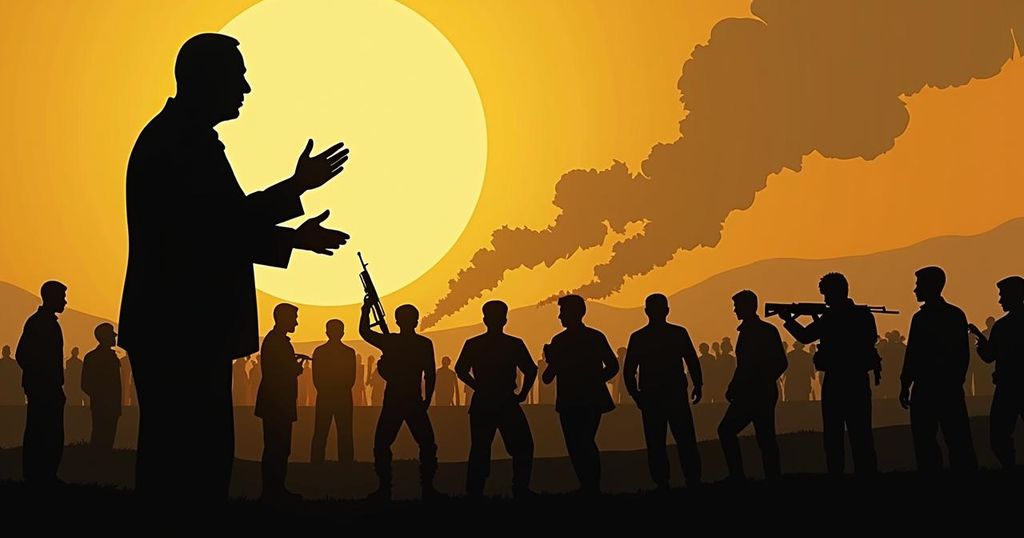Netanyahu Vows Continued Military Efforts Against Hezbollah at UN General Assembly

In a staunch defense of Israel’s military actions, Prime Minister Benjamin Netanyahu declared at the United Nations General Assembly that Israel will persist in degrading Hezbollah until its goals are achieved. His address drew mixed reactions from world leaders, reflecting the tense political climate in the Middle East amid ongoing conflicts. Notably, Netanyahu emphasized Israel’s right to defend its citizens as violence continues to escalate, leading to international calls for peace efforts and cease-fires during this tumultuous period.
Israeli Prime Minister Benjamin Netanyahu addressed delegates at the United Nations General Assembly, asserting that Israel would persist in “degrading Hezbollah” until it fulfills its strategic objectives along the Lebanese border. Emphasizing his purpose for attending the assembly, Netanyahu stated he needed to counter the “lies and slanders” directed at Israel. His speech occurred amidst ongoing conflicts in the Middle East, where violence from groups such as Hezbollah and Hamas remains a critical issue. Netanyahu announced that Israel would not back down, vowing to continue military actions against Hezbollah until achieving total victory, reiterating, “We will fight until we achieve total victory. Total victory. There is no substitute for it.” His remarks elicited polarized reactions from international leaders, with representatives from Slovenia, Barbados, and Pakistan condemning violence and urging peace initiatives in response to the region’s turmoil. Netanyahu’s presence was marred by protests outside the General Assembly, where demonstrators criticized Israel’s military activities. As he delivered his address, Netanyahu pointed fingers at Iran, claiming it contributed significantly to regional instability through its support for Hamas and Hezbollah. The prime minister conveyed that Israel would continue its military operations in Gaza and against Hezbollah, claiming that these actions were justified for the nation’s defense. He expressed frustration towards the perception of Israel’s military responses as inadequate, advocating for an aggressive stance against threats to Israeli citizens. Netanyahu’s speech followed a week of intense Israeli airstrikes in Lebanon, raising further concerns about the potential for escalation into a broader conflict.
The current discourse surrounding Israeli Prime Minister Benjamin Netanyahu’s address at the United Nations General Assembly highlights the escalated tensions in the Middle East, particularly concerning the ongoing conflict with Hezbollah and the situation in Gaza. Netanyahu’s remarks come at a time when diplomatic efforts, including a proposed cease-fire, are being challenged by the realities of sustained military engagements on both sides. The backdrop is characterized by Israel’s counteractions to the persistent aggression from Hezbollah, which has recently intensified due to regional dynamics linked to the Israeli-Palestinian conflict. The recent spate of confrontations began with Hamas’s attacks in October, which led to an engaged military response from Israel. As a consequence, civilian casualties have escalated, and diplomatic relations with other nations in the region remain fraught with tension. Netanyahu’s speech serves both to reassure his domestic audience of his government’s commitment to national security and to position Israel’s narrative in the international arena.
In conclusion, Prime Minister Netanyahu’s address at the United Nations served not only to reaffirm Israel’s military stance against Hezbollah but also highlighted the broader regional tensions affecting the Middle East. The mixed responses from international leaders reflect the divergent opinions on Israel’s military operations and the urgent call for peace amidst escalating violence. Moving forward, the complexities surrounding these conflicts pose significant challenges to diplomacy and regional stability as well as humanitarian concerns that remain paramount in the ongoing struggles faced by civilians.
Original Source: apnews.com







